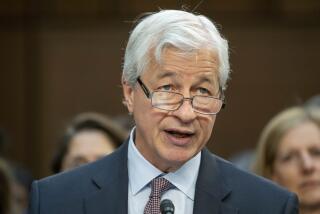The “people who matter” support Jamie Dimon at JPMorgan
- Share via
Who are the “people who matter”? According to Andrew Ross Sorkin of the New York Times, “investors, analysts, board members and, yes, even regulators,” none of whom, he says, wants Jamie Dimon fired as chairman and CEO of JPMorgan Chase.
Is there a weaker argument for Dimon’s survival, given that he has presided over an institution that tops all other big U.S. banks in the number and scale of its regulatory inquiries? (We raised the question of Dimon’s leadership record last week, after JPM reported its first quarterly loss of his tenure -- all due to the bank’s spending on legal fees and legal settlements.)
Who does matter on the issue of Dimon’s performance? Leaving aside that Sorkin doesn’t name any regulators who have weighed in recently on whether Dimon should stay or go, investors, analysts and board members are certainly not the only stakeholders who count.
Indeed, defining people directly involved in a company or the financial markets as the only stakeholders who matter is a peculiarly cramped way of thinking about a corporation’s role in society, especially given the financial and legal benefits that go along with a corporate charter in the U.S. All society has a stake in corporate integrity, and that’s where the questions about Dimon’s leadership are focused.
Who else matters? What about members of the public -- say, in California, where JPMorgan’s chicanery in the electricity trading markets may have cost ratepayers as much as $200 million, according to state energy officials. Federal regulators certainly aren’t happy with the bank’s behavior in that case -- the Federal Energy Regulatory Agency sued JPMorgan last year for lying about documents the agency had demanded as part of its investigation of the electricity scam. By the way, the bank paid $410 million to get the energy regulators off its back.
Then there are investors dependent on accurate quotes on international interest rates. They’re probably not happy about JPMorgan’s alleged participation in a scheme to rig LIBOR (the London Interbank Offered Rate), which sets prices on a staggering volume of transactions. And investors in Bernie Madoff’s Ponzi scheme, which Morgan is accused of aiding and abetting.
Is it only investors, analysts and directors who should care about JPMorgan’s spectacular trading loss -- more than $6 billion -- in the so-called “London whale” trading? Should anyone else care that Dimon dismissed the first reports of the losses as “a complete tempest in a teapot”? Or that the trading showed that this huge, systemically crucial bank had such sloppy risk management policies in place that it didn’t even know the exposure it faced from one department’s trading? Haven’t we learned that faulty risk management can bring down a big bank -- and threaten the entire financial system?
Everybody with a stake in the stability of the financial markets -- and that’s all of us -- should “matter.” Our interests aren’t protected by a bank’s investors or directors. That job belongs to regulators, who haven’t treated Dimon sternly enough.
Dimon’s record points to a systematic failure of legal and regulatory compliance throughout the entire company. When a problem bubbles up, yes, Dimon addresses it, sorta. Morgan’s internal investigation of the London whale debacle, conducted by an executive directly beholden to Dimon, has been roundly panned as a whitewash. “It’s like asking Joe Paterno to do the Penn State investigation,” remarked former SEC Chairman Harvey Pitt.
Of course Dimon has no dearth of supporters. He’s made a lot of money for many people, including investors and board members. What’s disturbing is that a lot of their profit seems to have come from the bank’s cutting ethical and legal corners, which costs everyone else money. But then, everyone else doesn’t matter, right?
More to Read
Inside the business of entertainment
The Wide Shot brings you news, analysis and insights on everything from streaming wars to production — and what it all means for the future.
You may occasionally receive promotional content from the Los Angeles Times.











